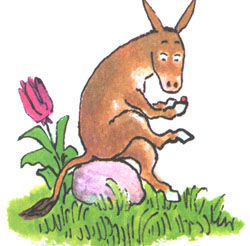I’ve adored William Steig’s Sylvester and the Magic Pebble, as well as many of his other works, since childhood. There are so many reasons why, not least of which is his use of language most other children’s book authors probably consider too advanced for their target audience. Yet, somehow, Steig makes the meaning clear to a four-year-old without talking down to her. It’s wonderful.
Tonight, reading the Magic Pebble for the 143rd time to my younger child, I noticed another thing to love about it. Sylvester is a scientist!
To make a test, he put the pebble on the ground and said, “I wish it would rain again.” Nothing happened. But when he said the same thing holding to pebble in his hoof, the sky turned black, there was lightning and a clap of thunder, and the rain came shooting down.
Now, this is not a big deal to us sophisticated grown-ups. But to a young child trying to figure out the world, this is a fantastic message. It’s worth stopping and discussing this passage with one’s child. And next time I read it to mine I will. How did Sylvester know the pebble was the cause of the rain? Why did he try wishing for rain while not holding the pebble? What if it had rained in that case too? What would Sylvester have thought then?
Bonus points if you can get your four-year-old to learn the term “controlled experiment.”



